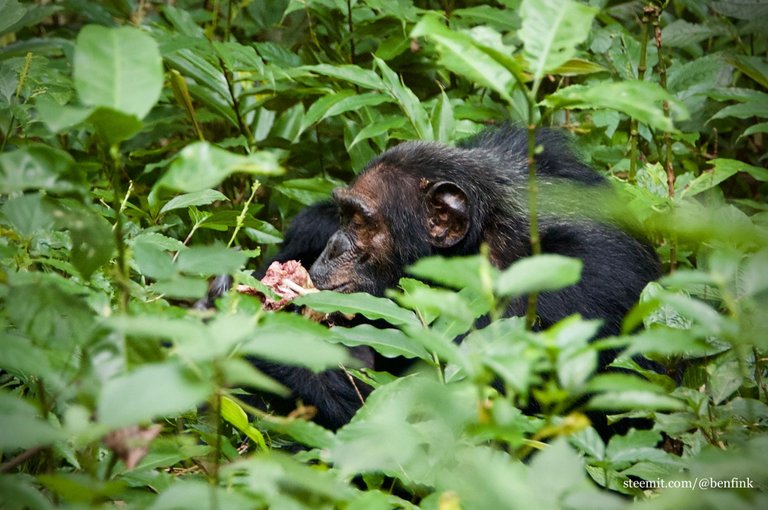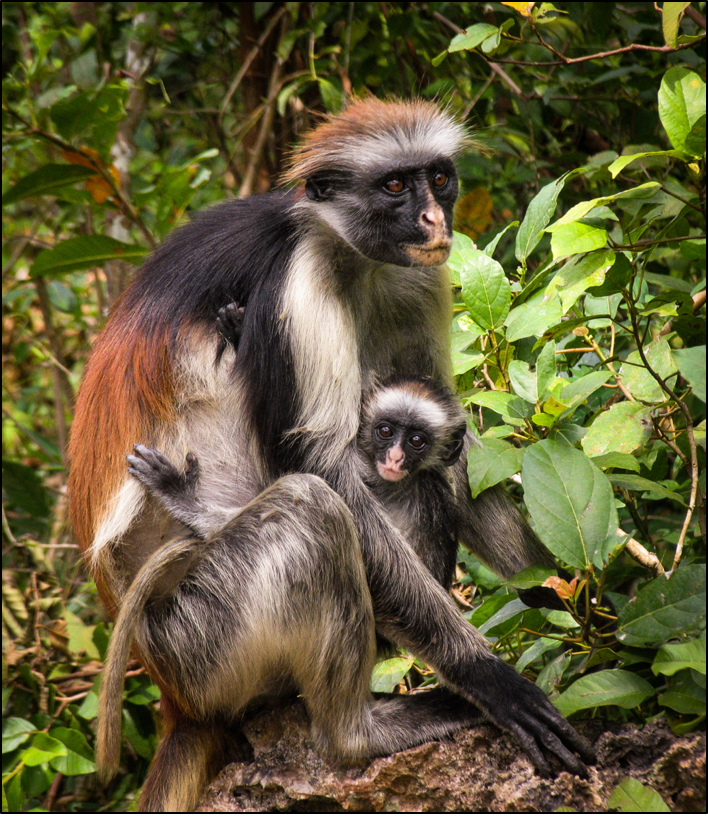The group marched in silence until a scream broke everyone into a sprint. The hunt was on.
Another noise I didn’t recognize joined the chimpanzees’ pants and shrieks. The alarms from red-colobus monkeys only fed the frenzy. On all sides, adult males, females, juveniles ascended tree trunks. I looked up to see clambering bodies cornering their victims at the top of the canopy. Suddenly, a chimp climbed down, a fuzzy body dangling in his mouth. By the end of the hunt, there would be four dead monkeys.
Just another day researching the Ngogo chimpanzees of Uganda. I had never seen chimpanzees hunt before, but just last week I saw two.
Just after the kill, Jackson charges with prey in Hand. Morton holding his own monkey moves to get out of the way. A female descends the tree to follow, hoping to get some meat of her own. (Sorry for poor quality! Uploading from rainforest has its limits)
Reveal spoiler

A hunt earlier last week: Brownface (a 52 year old male) consumes a black and white colobus infant.
What meat do chimps eat?
Anything they can get their hands on. Small mammals are preferred prey, and often monkeys like the red colobus. For instance, the Fongoli chimpanzees are known to kill bush babies (another primate), sometimes by thrusting a stick into a tree cavity. You read that right, spears! Chimpanzees may also snatch up duiker, or forest deer. After killing another chimpanzee, they may even cannibalize. Regardless, the red colobus do seem to be preferred prey as on this day.
Reveal spoiler

A red colobus monkey. Eating infants and juveniles is much more common. Even for the biggest chimpanzee, an adult male red colobus is intimidating and dangerous. Note : chimps are apes, not monkeys. Monkey = tail. Ape = no tail. Photo by David Edric.
When do chimpanzees hunt?
Chimpanzees don’t hunt when food is scarce, just the opposite. The Ngogo chimpanzees hunt more when they can get enough energy elsewhere. It makes sense. Hunting is energetically expensive and risky; they might not find prey, or might not manage to catch anything.
Are chimpanzees effective predators?
Yes, some estimate the chimpanzee hunting success rate to be around 60%. Here however, the Ngogo chimpanzees enjoy an especially high success rate of over 80%. Compare this to studies of carnivores: lions at 26%, cheetahs at 30%. Why so good? Maybe this is because Ngogo simply has more chimpanzees, and the size of the hunting party correlates to hunting success. Overall, it might also help that chimpanzees do not need to hunt everyday or even often. They are primarily frugivorous as ripe-fruit specialists.
In fact, the Ngogo chimpanzees are such good hunters, they’ve practically driven red colobus to extinction in their territory. From 1995-2000, researchers observed 317 kills in this single community. They estimated that ≈ 3 - 4% of the red colobus population succumbs to chimpanzee predation each year. As a result, there isn’t nearly so much red colobus hunting as there used to be, and maybe the chimpanzees are switching to add other animals to their menu.
Reveal spoiler
 Declining red colobus population density from Watts & Amsler (2013) : Chimpanzee-red colobus encounter rates show a red colobus population decline associated with predation by chimpanzees at Ngogo
Declining red colobus population density from Watts & Amsler (2013) : Chimpanzee-red colobus encounter rates show a red colobus population decline associated with predation by chimpanzees at Ngogo
Do females hunt?
Yes again. Female chimps do hunt and eat meat. In fact, those who get more meat also have more kids.
Why do chimpanzees hunt?
Researchers debate this a lot. Some have proposed a meat-for-sex hypothesis. At one site, male chimpanzees mate females frequently if they have shared meat with them. However, this was only over an extended period, and other studies have shown no relationship between sharing and sex. Maybe meat is just nutritious. Chimpanzees appear to get especially excited when there is meat around. Some researchers think it may have important micronutrients, like vitamins, which could explain why meat isn’t an essential part of the diet, but is still highly valued.
The micronutrient value of meat also lends itself to the meat scrap hypothesis. Hunts might not be energetically efficient, but hunting in groups might be encouraged if many participants can obtain just a bit of meat.
Thank's for reading, steemit! Looking forward to your questions and uploading more chimpanzee adventures.
Follow for more chimpy sciencey goodness @benfink.
100% of any steem earnings go directly to chimpanzee research and conservation

I noticed a common thread in various replies : that chimps are "cruel, brutal, scary," etc. While I do not disagree one bit, I think this reaction to chimpanzees is fascinating and says something about our psychology.
If my post instead wrote on lion, wolf, or eagle hunting, would the response be the same? It seems more natural when typical predators do these things, although they can be just as cruel; it is common to begin eating prey while it is still alive.
I think everything chimpanzees do is heightened emotionally for us because they are so human-like. They are more admirable, more repulsive, more intelligent, more primitive, simply because we always compare them to ourselves, consciously or not. Alternatively, maybe because it is just surprising to see a primate eat another primate, as the title of my post suggested.
The brutal side of chimpanzees is provocative, hence all the documentaries concerning chimpanzee conflict. In future posts, I also want to highlight the compassionate and social side of chimpanzees. They form enduring friendships and care intensely for their young. They are indeed, very much like us.
Thank you @eric-boucher @justsailey @therealmrjones @sreevin @flauwy @voronoi
Wow, what a potent post you have served us here. Thank you for the great quality information and the short clip too.
I had seen a hunt on a BBC documentary a while ago where the chimpanzees had hunted dow another chimp, which they also ate. The document as well as what you are reporting our way doesn't surprise me.
Yet, you analysis relating to hypothesis on this matter were the most valuable parts of this story for me. Thank you for sharing the date and well as your well educated thoughts on the matter. It reminded me a bit of a thought shared by Australian Aborigines when they say that to their younger fellow "Keep kangaroo meat for the older fellow, as it might give "bad dreams" to the younger ones..." Lots to ponder in relation to this saying, whether it is taken literally but most probably and importantly metaphorically as well.
All for one and one for all! Namaste :)
A good saying, thanks for sharing @eric-boucher. I'm writing down that saying to use when I teach about subsistence groups and meat sharing, humans do share more than others after all.
the gif broke, here's a better version
Never knew there's so much to a chimpanzee. Like I'm amazed. This is a really interesting write up. Keep going at it and will check out that url to the chimpanzee project! Cheers!
Wow. So much information! This is really interesting.. I guess the wildlife is pretty cruel with their source of food haha.
Chimps are ruthless....I saw a doc on nature channel called the "dark side of chimpanzees" and they can be brutal to each other as well...wars, hunting each other among other things......they are ALMOST as brutal as humans!
This is wonderful pics, narrenting the behaviour of chimpanze and their hunting style. And the cautions that must be taking.good write up..
Very interesting information. My son loves to see your pictures and read all about your adventures. What an amazing life you lead!!
Thanks, @wickedcute! Really sweet to hear your son finds this stuff interesting. Kids are the best audience for all things animal :) Please let me know if he has any questions I'd be happy to answer
We will be following you! Lots of questions to come
Eow what a cool post man so much information. I really like it
really loved ur post , checkout mine you might like it https://steemit.com/science/@whitedolphin/forefront-consciousness-and-healing-science-research-reports-in-the-field-8-9-july-2017-conference-encinitas-california
thanks for sharing
Very informative.
Thanks for sharing.Great post @benfink
.. Followed! .. and please do keep in touch to see my contributions.
@benfink i want u to be my guide for Phd after i complete my masters in anthropology #primate #upvote
it'd be an honor @satfit. Good luck with your masters. Go anthro!
The shared meat-for-sex observation is pretty fascinating... is there any overlap in typical diet (fruits etc.) between the colobus / chimp? Would that overlap be an impetus for chimpanzees to hunt colobus monkeys more directly than other meaty options like the duiker?
Hey @voronoi, good questions. I didn't read who the poster was for a bit and was like "hmmm who this critical thinker?"
I should have done a better job making clear that I think the meat-for-sex hypothesis is pretty well rebuked - I don't buy it. Maybe it happens at this one site, but see my response to @oldfangle for more info on who actually gets the meat. An extra detail: anecdotally at Ngogo, old individuals seem to commonly get meat, males and females alike. What's up with that??
Colobus are largely folivorous, leaf-eaters, but will eat fruit as well. I think that even if their diet overlapped more, this would not explain their targeting as prey. Feeding competition is rarely, I dont think ever, a explanatory reason for predation
Let's consider the evolutionary math, it's all about costs and benefits for the individual. Sure, the chimpanzee group hypothetically has more food if there are no colobus in their territory, but what is the return for a single chimpanzee hunting? Those benefits would be far in the future with pop. decline, displaced benefits like this are much weaker evolutionarily speaking. Also, benefits would shared across the entire group, but hunting is personally costly and dangerous. If a chimpanzee is worried about food security, that time is better spent just eating more, perhaps storing calories in fat, rather than running off to hunt for a possible-much-later food benefit. Maybe group benefits do matter, but individual aspects are more salient.
So why catch some prey over others? Consider the chance of finding prey, the cost of obtaining the prey (energetically and in terms of danger), and then the nutritional value of the carcass. Duiker are solitary and fast on the ground. Colobus live in groups and can be cornered at the top of a tree. This might also explain why they hunt red colobus more than black and white, perhaps the later are just better at getting away.
Now i can believe that chimps are predecessors of humans indeed, so cruel thats why.
Wow, interesting behaviour from the chimps. I have seen this in a documentary before. A bit scary though.
You are being followed by a coin puppet!
Please follow it back ;)
Great post. Raw in every sense of the word.
Do the chimps prefer any particular part of the colobus monkeys? Do higher ranking chimps take the "best" and leave less desirable parts for lower ranking members of the hunt? And do they eat all of the monkey? Or can researchers collect what remains to perhaps learn how they hunt and consume?
You are on a roll, @oldfangle. You ask the same questions as primatologists.
Even a full grown chimpanzee cannot consume an entire monkey. Since their digestive systems are designed for fruit, not tissue, it can take hours of chewing just for a bit of meat. Whoever has the carcass may select the best bits for themselves and the rest could go to others (those who crowd around begging for meat).
Here's an excerpt from a recent conference talk by Prof Ian Gilby of ASU, with one of the best titles ever : BRAAAINS!!!
Anecdotally, I've heard researchers from other sites say that chimpanzees love the hind guts. Maybe it depends on what kind of monkey or prey.
sorry I didn't answer all your questions in first reply
It's unclear. A good amount of data says whoever begs the most (i.e. harasses the holder) gets the most meat. Other data suggests that maybe chimpanzees may share reciprocally, a chimp will give more meat to their buddy and in turn may get meat from them later. This form of reciprocal altruism is extremely rare in nature and needs to be tested further.
Yes, but this is tough! I can't think of a systematic study on this, probably because we can't recover carcasses since they love them so much. Ethically, tricky to obtain and test wild meat nutritional content.
Thanks for the thorough, thoughtful and interesting replies. I find the issue of ethics in field research very interesting. I'm guessing this is an emerging side of the profession? A curious parallel on the part of Anthropologists to the targets of their study? Instead of rules on sharing meat, the humans develop rules on collecting and sharing information.
Only 1 word --- EXCELLENT
Followed, upvoted and resteemed.
pls follow me.
Congratulations @benfink! You have completed some achievement on Steemit and have been rewarded with new badge(s) :
Click on any badge to view your own Board of Honnor on SteemitBoard.
For more information about SteemitBoard, click here
If you no longer want to receive notifications, reply to this comment with the word
STOPBy upvoting this notification, you can help all Steemit users. Learn how here!
wow
impressive photo.~
thank you for sharing
I feel for the red colobus infants :,(